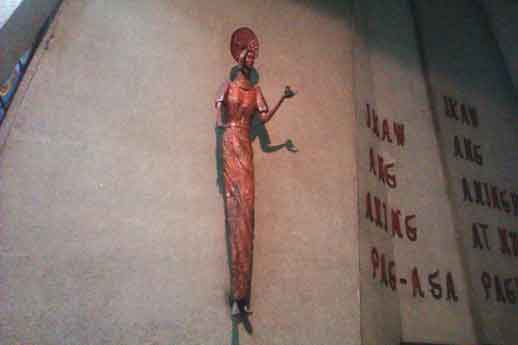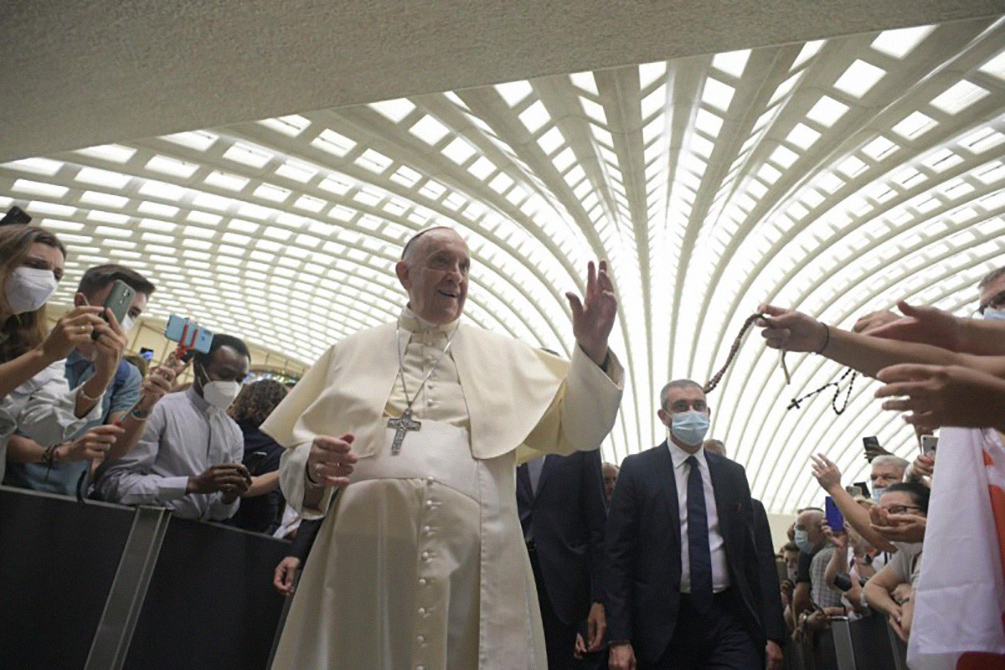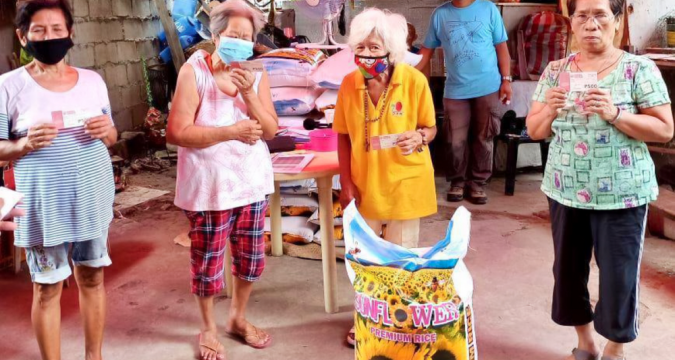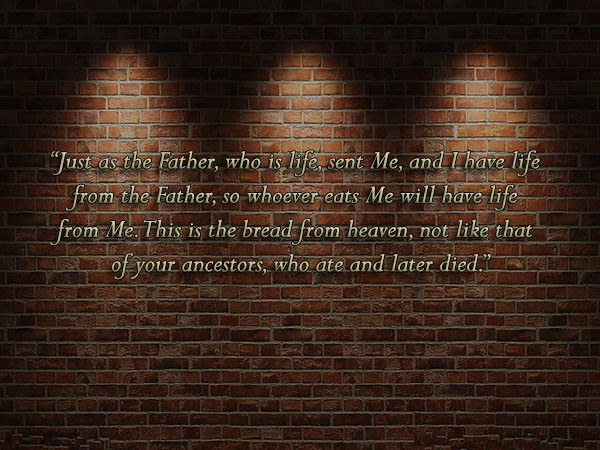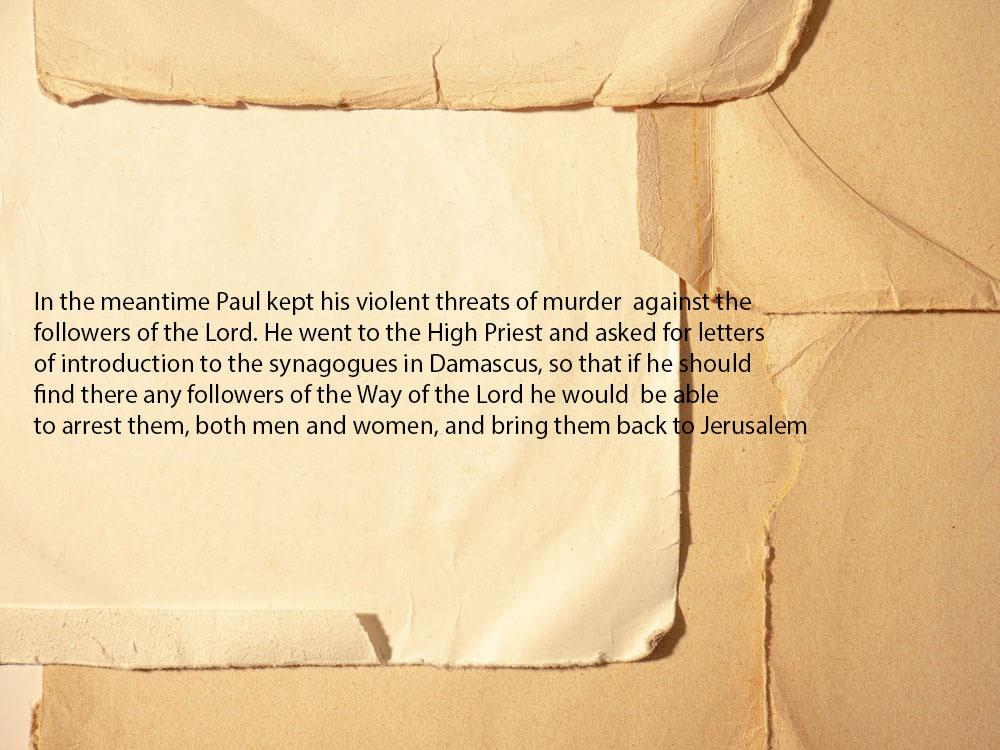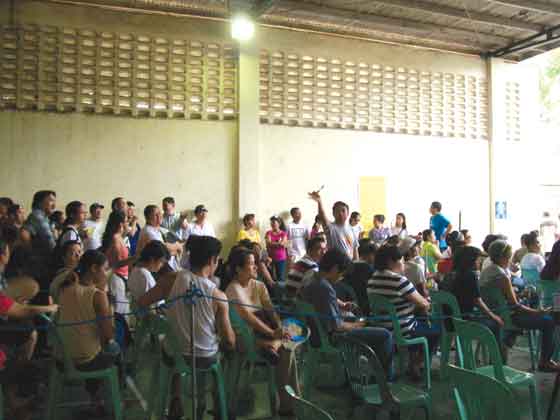
by Joe Torres
On the evening of May 7, 2004, three days before the national elections, a crowd gathered in front of the provincial capitol of Tarlac. Although wary of the presence of journalists who earlier in the day arrived with their cameras and satellite vans, the faithful behaved as if it was just one of those anniversary prayer rallies where they’d gather to sing, dance, wave their white handkerchiefs and pray the whole night.
That Friday night, however, was different. The music was a bit louder, the marshals were more alert and the media were all over. For those in the know, the excitement was expected. The president of the Philippines, who was seeking a full six-year term through the elections three days later, was scheduled to make an appearance in lieu of an endorsement by Bro. Mike Velarde, leader of the El Shaddai Catholic charismatic movement.
The faithful waited in vain. President Gloria Macapagal-Arroyo was a no-show. She decided to hold a closed-door meeting with Velarde. The prayer rally went on sans the president. There was no need for an appearance. The endorsement was in the bag.
“Bro. Mike Velarde gave President Arroyo the El Shaddal shepherd’s blessing,” said Mel Robles, spokesman of the charismatic movement. He said Mrs. Arroyo has always been a regular attendee and follower of the EI Shaddal since 1992, thus the endorsement.
The deal, however, cost Mrs. Arroyo more than just a pledge to attend El Shaddai prayer rallies. Robles said Velarde gave his blessing after the President agreed on four issues: a pro-life stance, fighting graft and corruption, convening of a constitutional convention immediately after the May 10 elections, and the pursuit of “national healing and reconciliation” to address the widening gap between her supporters and those of ousted president Joseph Estrada.
Robles refused to say how many votes the El Shaddai would deliver to their chosen candidates, but Mrs. Arroyo was confident that El Shaddai’s endorsement could provide the providential margin of votes that would add up to her victory in the polls.
Earlier in the day, the Iglesia ni Cristo (INC), a small but well-connected sect that supposedly votes as one, also issued a statement endorsing the candidacy of Mrs. Arroyo. It even distributed sample ballots to its members, estimated to number between a million and six million, instructing them to choose Mrs. Arroyo.
Bienvenido Santiago, INC spokesman, said INC executive minister Erano “Ka Erdie” Manalo made the decision after consulting with ministers of the church and “after much prayers and reflections.”
“In making its decisions whom to vote for, the [INC] takes into account the general well being of its flock and commitment of the candidates to guarantee the untrammeled exercise of religious freedom,” Santiago said in a statement issued later in the day.
A capability to govern – both physically and intellectually – and a political will to effect national unity and peace are also factors considered, Santiago said.
Not to be left behind the Roman Catholic Church issued statements which indirectly endorsed Mrs. Arroyo by calling on the faithful to shun inexperienced candidates. Considered to be Mrs. Arroyo’s strongest rival in the 2004 presidential race was actor Fernando Poe Jr., a neophyte in politics.
A few months before the elections, the Catholic Bishops Conference of the Philippines (CBCP) said “elections are a crucial moment in our continuing task of nation-building.” It added: “They’re a timely opportunity to transform society by electing wise, capable and upright leaders.”
Former CBCP president Archbishop Fernando Capalla said voters have a “right and duty” – to “discern and choose candidates” based on the criteria of competence, conscience and program of government.
Playing Politics
Various religious groups in the country have become political animals that work to preserve their relevance and influence. Churches, especially its leaders, have become crucial players in politics. Some try to harness their “authority” in exchange for material or political favors.
During elections, religious groups project themselves as moral beacons that guide the faithful in making what are supposed to be enlightened political choices. During the martial law years, church groups, through various pronouncements and “prayer rallies,” emboldened the ranks of the opposition.
“The church found itself in a particular distinct position of influence because the brazen ineptness of other institutions particularly the military, the bureaucracy and the legislature created a social vacuum,” said political analyst Marvin Bionat.
The struggle against the dictatorship of Ferdinand Marcos became a morality play that forced the church to assert its authority. During the 1986 snap elections, church leaders became active players in the electoral process. Homilies dealt with the moral obligation of the faithful to ensure clean and honest elections. Nuns and seminarians acted as field campaigners for the opposition.
Despite the Vatican’s repeated calls for neutrality, former Manila Archbishop Jaime Cardinal Sin took a stand against Marcos and even called on the faithful to troop to the streets, starting what was later known as the People Power revolution.
After the fall of Marcos, Cardinal Sin continued his involvement in politics. He ignored official statements that the Church does not openly endorse candidates. In 1987 he endorsed what he dubbed, as the “ten outstanding senatorial candidates” belonging to traditional political parties. He also tried to undermine the candidacies of senatorial aspirants belonging to the progressive Partido ng Bayan who he likened to “lepers.”
The Roman Catholic Church in the Philippines justifies its involvement in politics as its way of addressing social inequities. The Second Plenary Council of the Philippines (PCP II) in 1992 encouraged more active participation of Church groups in the elections when it called on the lay faithful to actively participate in political affairs.
PCP II states that Philippine politics “has been the most hurtful of us as a people. It is possibly the biggest bane in our life as a nation and the most pernicious obstacle to our achieving full development.”
It says the Church can intervene in the electoral process during “extraordinary” situations. “This happens when a political option is clearly the only one demanded by the Gospel. An example is when the presidential candidate is clearly bent to destroy the Church and its mission of salvation and has all the resources.”
PCP-II reiterated that church leaders, priests and nuns, are bound by the “preferential option for the poor.” The clergy are also supposed to involve themselves in politics “if the welfare of the majority is at stake,” a condition, which observers say is certainly very open to the most liberal interpretation.
More direct role
In recent elections the role of many religious groups has become more direct, deliberate and complex.
In 1995 a group calling itself the National Council of the Laity of the Philippines endorsed eight senatorial candidates. The CBCP hierarchy, however, criticized the group for soliciting P350, 000 from each endorsed candidate. The group said they needed the money to defray the cost of campaign materials, but the bishops said the acceptance of money could become a “dangerous precedent.”
The practice of endorsing candidates by religious groups was challenged before the Supreme Court before the 2004 elections. Although the petition did not convince the judges to hand down a definite interpretation of the constitutional provision of the separation of church and state, the High Court’s decision affirmed the belief that only a thin line separates politics and religion especially when it comes to the issue of elections.
Without having to worry about the constitutional separation of state and the church, lay groups and non-mainstream religious organization have been more forthright with political endorsements and even running for elective government posts.
The presidential bid of a charismatic preacher, who ran on a “righteous governance” platform challenged traditional politics and signaled the politicization of what has been always dubbed as a conservative segment of the church.
Other religious groups also discovered the potential of transforming traditional faith-based organizations into effective political machineries. At least three party-list groups backed by religious organizations won seats in Congress by riding on the voting power of their respective flocks.
The progressive’ church
The 2004 elections witnessed the emergence of a broad church-initiated advocacy group that called itself the Patriots. It claimed to be an independent poll watchdog that pushes for clean elections and what it calls a “people’s platform of governance.”
A lot of progressive church-based groups flourished during the anti-dictatorship struggle. Some of them, especially from the Roman Catholic Church, gave up the struggle after Marcos was ousted. Since 1993, however, numerous church people have been observed actively supporting the militant struggle of peasants and workers.
The Patriots asserted what its leaders said is church’s prophetic role in society. It challenged the credibility of the 2004 elections and even went on loggerhead with the Roman Catholic Church’s hierarchy when it challenged the CBCP’s declaration that the elections were “generally, clean, honest and peaceful.”
At least 24 Roman Catholic bishops, 68 social action directors, priests, nuns and lay officials from 13 dioceses vouched that the May 10, 2004 elections were generally clean, honest and peaceful. The bishops even called for a speedy canvassing and proclamation of winners.
The CBCP claimed that the appeal served as a wake up call to the sluggish joint Congressional canvassing of votes. The bishops, however, emphasized that the positive assessment of the elections does not gloss over irregularities like voters’ disfranchisement, vote-buying and selling, inefficiency of Comelec officials, attempts of cheating and “isolated harassment” resulting to injuries and deaths.
Malaybalay Bishop Honesto Pacana even lauded the role of youth volunteers during the elections “as a positive manifestation of Christian idealism and love for the country.”
The Patriots, however, presented a report confirming allegations of massive fraud and violence during the elections. It also initiated a wave of protests against electoral fraud and violence. Catholic priest Joe Dizon, one of Patriots’ initiators, even challenged Mrs. Arroyo and the members of the Commission on Elections to resign because of widespread fraud and terrorism in during the polls.
Dizon said the entry of various church-based groups in the electoral arena is a reaction of the “silent middle class” to traditional politics. He went further to observe what he described as the “politicization” of the traditionally apolitical segments of churches.
The role of the religious sector has evolved and diversified through the years. From bestowing sacramental sanctions on the state and its actions, several churches and religious groups have taken on more active and deliberate roles and even tried to influence government policies.
Protestant theologian Sharon Rose Joy Ruiz-Duremdes, a member of the Patriots, said her Group’s entry into the political arena is consistent with the church’s supposed role in society. “Under any condition and under any regime, the church must stand for the majesty of truth. The church must take to task perpetrators of any form of deceit and deception, any use of terror to coerce the people into submission, even if tactics are used against a presumed godless enemy.” she said.
In the context of the elections, Ruiz-Duremdes said the church must demand the truth and must ensure that the sanctity of the electoral system is upheld. She said: “[The church] must guide its flock in exercising informed suffrage. It must accompany its constituents in bringing to the fore life issues that must be addressed by the candidates. It must help empower its members so that they will be able to stave off the temptation of corruption and fraud.”
This is, however, viewed as problematic by some progressive religious groups that believe the present electoral system is hopeless under a government that is controlled by traditional politicians, oligarchs and the ruling class.
Opportunism
The Roman Catholic Church and the country’s political leaders who have taken advantage of the customary flock of the church have acted as a social force within Philippine society to help preserve the unjust property relations that favor the big bourgeoisie and the landlord class.
During the dark years of martial rule, for instance, a number of church people stood up against the brutality and persecution of the dictatorship and joined the ranks of the people’s struggle. A few church leaders lent their support to the struggle. In the main, however, the church hierarchy practiced “critical collaboration” with the dictator and preserved the status quo.
Only towards the end of the Marcos regime did the leadership of the Roman Catholic Church take a firm stand against the government. Galvanized by the people’s anger and together with the ruling elite, the church assumed leadership over the uprising-cum-mutiny that brought about the downfall of the Marcos dictatorship.
The church leadership lent its support to subsequent administrations, including its anti-people policies. During the Aquino administration, the church leadership did not criticize the fact that despite the “democratic space,” former martial law implementors remained in the government. Church leaders also did not protest when Aquino instituted her “total war policy” and established vigilante groups and religious fanatical organizations.
Church leaders also remained silent when Ramos installed his “globalization” policy that allowed the alleged plunder of the economy and natural resources and removed practically all forms of trade protectionism. The church only became critical of the ruling administration when people started to protest against the proposal to change the Constitution and the possible return of martial rule.
During the subsequent administration, the church criticized Estrada mainly because of his morals but remained silent despite the continuing pro-foreign and anti-people policies of the administration. The church distanced itself from the Estrada administration only when massive protests started and when the people’s movement called for the ouster of Estrada. The church again assumed a leadership role in the anti-corruption movement that brought down the Estrada administration.
With Mrs. Arroyo, the church refused to raise an active voice against what militant groups called as the “puppetry, militarist and anti-poor policies” of her administration. The church even endorsed Arroyo’s quest for another term in office.
Despite the emergence of progressive groups within the religious sector, the historic opportunist tendency of institutional churches that consequently legitimizes anti-people policies of the state continues to play an important role in Philippine elections.
Political leverage and specific concessions from politicians seem to be among the reasons why religious groups are keen on endorsing candidates during elections.
In 1992, for instance, Eduardo Cojuangco, who ran for president, reportedly got the INC backing after he promised two Cabinet positions, 15 hectares of prime land in Metro Manila and an undisclosed amount of money.
To maximize political gains, INC leaders allegedly try to pick the most winnable candidates. In 1967 the INC withdrew support for Liberal Party senatorial candidates after Marcos reportedly assured Manalo that he would do everything to ensure a 7-1 Nacionalista Party victory.
The INC also reportedly makes sure that it bets on winning candidates. It reportedly conducts its own survey and, in cases of close contests, delays the picking of their choices until two to three days before the elections.
The Roman Catholic Church’s influence, however, is more evident. Even a United States country report on the Philippines states that much. “The Catholic Church’s influence on the government was quite evident in the lack of resources devoted to family planning and the prohibition of divorce,” it says.
The report classifies Roman Catholics in the Philippines in to three general groups: “Conservatives who were suspicious of social action and held that Christian love could best be expressed through existing structures; moderates, probably the largest group, in favor of social action but inclined to cooperate with government programs; and progressives, who did not trust the government programs, were critical both of Philippine business and of American influence, and felt that drastic change was needed.”
It added: “Progressives were especially disturbed at atrocities accompanying the use of vigilantes [during the Aquino administration]. They denied that they were communists, but some of their leaders supported communist fronts, and a few priests actually joined armed guerrilla bands.”
The Roman Catholic Church as an institution also successfully projected an image of influence in politics that politicians are afraid to raise a raucous that might antagonize church leaders. Mrs. Arroyo, for instance, shot down proposals to tax churches and religious groups as the government sought ways to deal with a debt crisis.
“The Church is the guardian of the spiritual welfare of the Filipino people and charitable work is part of its mission to uplift the moral and spiritual foundations of our society,” Mrs. Arroyo said in a written statement. “This should be placed beyond the pale of monetary matters and we do not agree to taxing the Church.”
The church’s influence is better understood in the light of political endorsements done by various institutional churches and church groups during elections. Ruiz-Duremdes looks at it as disempowering.
She said: “Given the feudal nature of the church, political endorsements perpetuate feudalism. It is disempowering because it does not encourage church members to think critically and weigh issues and decide for themselves. It is an abuse of the church leader’s power. It does not respect the capacity of people to think and decide for themselves.”
Post-election pronouncements by Roman Catholic Church leaders could be viewed as a way to dampen militant action against electoral fraud and violence despite initial statements that they would investigate the reported widespread fraud during the elections. Progressive church groups look at the official church’s stance as a way of protecting the status quo.
‘Church vote’ a myth
The church in the Philippines can create a lot of noise when it comes to electoral politics. But does the church really deliver? Or Is it a toothless tiger that only growls to threaten politicians?
Recent political exercises proved that Filipinos don’t vote according to the dictates of their religion or the candidate’s church affiliation. Also, the highly influential like Catholic Church leaders, for instance, do not swing an election with their endorsement.
Fidel Ramos, a Protestant, won in 1992 despite the huge number of Roman Catholic voters; Ramon Mitra, who was endorsed by Cardinal Sin even finished badly at fourth place. Joseph Estrada, a Roman Catholic, won in 1998 although he kept several mistresses and allegedly engaged in various activities deemed immoral by the Roman Catholic Church.
Even the supposedly solid INC vote is a myth. In 1992 a group calling itself the INC Reformist Group, claimed that between 65 to 70 percent of church members resent the dictate of their leaders. A 1992 survey by the Quo Vadis Research Systems revealed that 33.8 percent of INC respondents would vote as they pleased and only 35.9 percent would follow the dictate of their leaders.
The same survey revealed that among Roman Catholic Church members in the Visayas and Mindanao, only 5.6 percent would obey church leaders. In Luzon, the figure was even lower at 3.76 percent. Those who indicated resistance to the dictates of church leaders in the Visayas and Mindanao are 59.06 percent and in Luzon 75.9 percent. Among born-again Christians, resistance was high at 70.86 percent.
A later survey by SWS showed a significantly higher percentage (22) of those who would agree to vote for candidates whom their church leaders endorse, while 55 percent would disagree.
“What is certain is that Filipino Catholic voters don’t vote as a bloc,” said political analyst Luis Teodoro. “The acceptance of any idea, much more a doctrine, whether political or religious, requires validation by personal need and experience,” he said.
But Filipino politicians don’t take chances and prefer to err on the side of the assumption that there is such a thing as a Catholic vote, Teodoro said. They have their photographs taken while receiving the sacraments or visiting a priest or kissing the hand of a bishop.
Carrying church issues is also not a guarantee to generate support. In 1995, Francisco Tatad, who ran for a seat in the Senate, carried the “pro-God and pro-family” line of the Catholic Church, but he received only 38 percent of Catholic votes while Juan Flavier, whose family planning program when he was Secretary of Health was attacked by the Catholic Church, garnered 53 percent during the elections.
The church’s failure to influence voters tends to erode the credibility of church leaders, political analyst Bionat said. “Perhaps because of this fear that most religious groups try to avoid taking the side of losing candidates by not naming specific political aspirants that it supports or opposes.” (Church guidelines, however, are often so obvious that naming names is hardly necessary).
The defeat of charismatic leader Eddie Villanueva, who claimed to have millions of’ followers, is another proof that the faithful do not vote as a block.
‘More than just faith in God’
It takes more than faith in God to win an election, The lack of a solid church vote is a sign that the Filipino electorate knows what it wants. Ruiz-Duremdes said Villanueva’s defeat, for instance, “is a clear manifestation that it take more than a ‘connection with the Lord’ to lead this country.”
On the other hand, Villanueva’s entry into the political arena and the victory of at least three parly-list groups, in Congress is a sign that the church is now looking at politics as a playing field, if not a field of mission. It is a leap from the view that politics is dirty and not an arena for religious groups.
The danger lies in the intention of the church in joining politics. Is it to perpetuate a conservative state as part of a structure that legitimizes and advocates the rule of those who promote the preservation of the status quo? Or is its intention to “change the face of the earth” and stop the old recipe of faith and confidence in a government that implements policies that do not benefit the people?
The Patriots believe that the church must live its role as a “prophet” and must challenge the state and its leaders to ensure that the people will get a government it deserves, whether it is election season or not. Ruiz-Duremdes said the church must be an active participant in the “people’s movement for national liberation.” Only then can it truly live out its mission and regain Its moral clout to be the voice of the Filipino masses, and maybe influence future elections.


